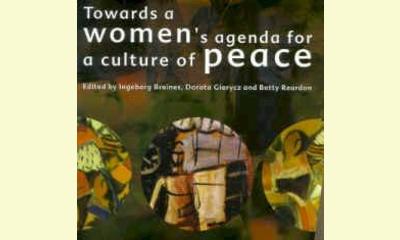|
|
Gender Perspective on a Culture of Peace: A Book Review
an article by Marta Ramón Pascual. Journalist. Barcelona.
Breines, Ingeborg. Towards a Women's Agenda for a Culture of Peace. Paris. UNESCO. 1999. 
click on photo to enlarge
This
manual sets out specific initiatives concerning the participation of
women in peace, women criticism to the rules of peace, etc.. The second
chapter of the first part, entitled 'Engendering's Gender Perspective
on a Culture of Peace', tries to explain that only if men and women work
together equally in rights we will overcome the obstacles that prevent
us from building a vision of future.
The author is Ingeborg Breines, Director of UNESCO's program
"Women and the Culture of Peace”. This chapter relies on the
interdisciplinary project of the same Organization, "Towards a Culture
of Peace" (1998), based on the principles described in the Charter of
the United Nations. UNESCO believes that peace must be sustained by
democratic participation, good governance and creativity. Education in
all its forms is understood as the key to democracy in daily life.
According to Federico Mayor Zaragoza, the "culture of peace consists in
moving from the logic of force and fear to the force of reason and
love”.
The X point of the Letter of Peace addressed to the UN says
"Democracy must take a qualitative leap in order to defend and favour
every person's opportunity to live in keeping with his or her conscience
without ever, of course, curtailing anyone else´s freedom, or causing
damage to others or to oneself". But what does this mean, which aspects
have to be changed? Furthermore, the point IX suggests: "it is clear
that it is impossible to build worldwide peace while in society itself,
and even in the family, there is disdain towards more than half of its
members: (children, senior citizens, marginalized groups and, of course,
women). Rather, a full recognition and respect for their dignity and
their rights would lead towards favouring peace". In sum, Breines´s book
and the Letter of Peace addressed to the UN agree completly that
equality, development and peace are inextricably linked: there can be no
lasting peace without development, or sustainable development without
full equality between men and women.
(Editor's note: This review was posted April 27, 2011 on the website of The Letter of Peace Addressed to the UN.
|








|
DISCUSSION
Question(s) related to this article:
What are the most important books about the culture of peace?
Thematic forum(s) in which this article is being discussed:
READING LIST - LECTURES CONSEILLEES
LATEST READER COMMENT:
The
following three books are recommended by the jhon foundation.
CPNN would welcome reviews of one or more of these books:
1. Peace education: A pathway to a culture of peace (2nd Edition)
edited by Loreta Navarro-Castro and Jasmin Nario-Galace
Publisher: Center for Peace Education
209-page
pdf book designed to provide educators with the basic knowledge base as
well as the skill- and value-orientations that we associate with
educating for a culture of peace. Although this work is primarily
directed towards the pre-service and in-service preparation of teachers
in the formal school system, it may be used in nonformal education.
Part
I presents chapters that are meant to help us develop a holistic
understanding of peace and peace education. Part II discusses the key
themes in peace education. Each chapter starts with a conceptual essay
on a theme and is followed by some practical teaching-learning ideas
that can either be used in a class or adapted to a community setting.. . ...more.

|
|
|
This report was posted on July 4, 2011.
If you wish to start a new discussion topic on this article, please copy the title of this article which is Gender Perspective on a Culture of Peace: A Book Review and its number which is 490 and enter this information along with your discussion question and an introductory response to the question here.

A few stories are retained on the main listings if they are considered
by readers to be a priority. If you have not already done so, please
take the time to check a box below: should this article be considered as
a priority?

|








